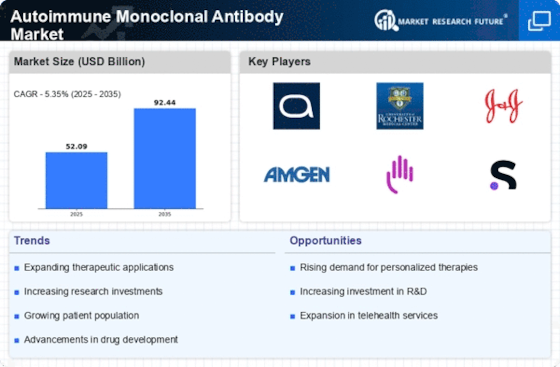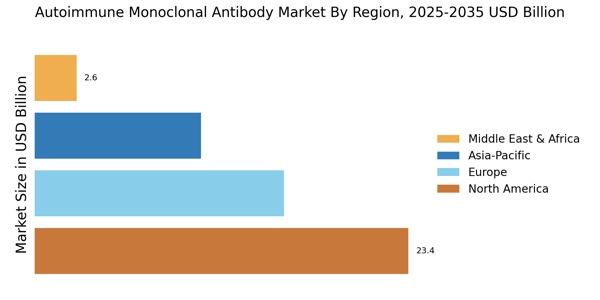Advancements in Biotechnology
Technological advancements in biotechnology are significantly influencing the Autoimmune Monoclonal Antibody Market. Innovations in genetic engineering and protein engineering have enabled the development of highly specific monoclonal antibodies that target specific pathways involved in autoimmune diseases. For instance, the introduction of bispecific antibodies and antibody-drug conjugates has expanded treatment options, enhancing efficacy and reducing side effects. The market is projected to grow at a compound annual growth rate of around 10% over the next few years, driven by these advancements. As research continues to unveil new therapeutic targets, the Autoimmune Monoclonal Antibody Market is poised for further expansion, with biotechnology playing a crucial role in shaping its future.
Rising Healthcare Expenditure
Increasing healthcare expenditure is a significant driver for the Autoimmune Monoclonal Antibody Market. As countries allocate more resources to healthcare, there is a corresponding rise in the availability and accessibility of advanced treatments, including monoclonal antibodies. In many regions, healthcare spending is projected to grow at an annual rate of 5-7%, reflecting a commitment to improving patient care. This trend is particularly evident in the management of chronic conditions such as autoimmune diseases, where effective therapies are essential. The willingness of healthcare systems to invest in innovative treatments is likely to enhance the market for autoimmune monoclonal antibodies, as patients gain access to cutting-edge therapies that can improve their quality of life.
Regulatory Support for Biologics
Regulatory bodies are increasingly supportive of biologics, including monoclonal antibodies, which is a key driver for the Autoimmune Monoclonal Antibody Market. Streamlined approval processes and incentives for innovative therapies have encouraged pharmaceutical companies to invest in the development of new monoclonal antibodies. Recent initiatives by regulatory agencies aim to expedite the review of biologics, thereby facilitating faster access to novel treatments for patients. This supportive regulatory environment is expected to foster innovation and competition within the market, leading to a wider array of therapeutic options for autoimmune diseases. As a result, the Autoimmune Monoclonal Antibody Market is likely to benefit from this favorable landscape, promoting growth and accessibility.
Growing Demand for Personalized Medicine
The shift towards personalized medicine is reshaping the Autoimmune Monoclonal Antibody Market. Patients increasingly seek treatments tailored to their unique genetic and molecular profiles, which enhances therapeutic efficacy and minimizes adverse effects. Monoclonal antibodies, with their ability to be engineered for specific targets, align well with this trend. The market for personalized medicine is expected to reach USD 2.5 trillion by 2025, indicating a robust growth trajectory. This demand for customized therapies is likely to drive investments in monoclonal antibody research and development, further propelling the Autoimmune Monoclonal Antibody Market. As healthcare systems adapt to this paradigm shift, the focus on personalized approaches will continue to influence market dynamics.
Increasing Prevalence of Autoimmune Diseases
The rising incidence of autoimmune diseases is a pivotal driver for the Autoimmune Monoclonal Antibody Market. Conditions such as rheumatoid arthritis, lupus, and multiple sclerosis are becoming more prevalent, affecting millions worldwide. According to recent estimates, autoimmune diseases impact approximately 5-8% of the population, leading to a growing demand for effective treatment options. This surge in prevalence necessitates the development of innovative therapies, particularly monoclonal antibodies, which have shown promise in managing these complex conditions. As healthcare providers seek to address this increasing burden, the Autoimmune Monoclonal Antibody Market is likely to experience substantial growth, driven by the need for targeted therapies that can improve patient outcomes.


















